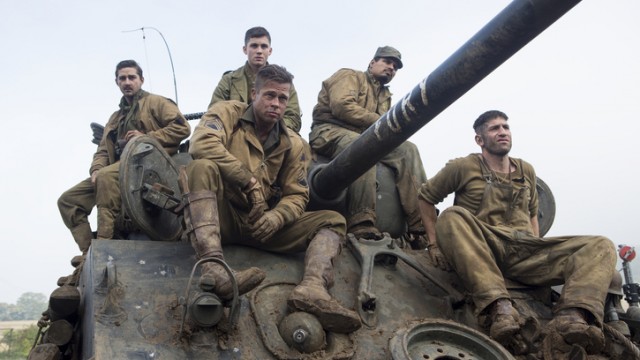Movie stars are a rare thing these days, but I think it’s safe to say Brad Pitt is one of the few we have today. He has the stunning good looks, a romance the entire nation fawns over and he’s got more than a few big movies under his belt. When he’s fighting zombies or being a baseball manager, audiences can’t get to his movies fast enough. His darker features though, like Killing Them Softly, do tend to falter at the box office.
Certainly Fury is a pervasively dark film, but it still found decent success at the box office this weekend, where it made an estimated $23 million, Pitts 10th biggest opening weekend for a live-action feature. I wish the film itself was able to manage even that level of solidness in terms of quality, but aside from a gangbusters finale, it certainly falls short of its potential. What a shame, as the start of the film seems to promise a film taking an uncompromising looks at the brutality of war. An extended shot of a Nazi soldier on his horse concluding with Brad Pitt attacking the man is actually well-staged and leaves the audience in shock at seeing a well known star like Pitt engaging in such graphic violence. Alright I thought, perhaps this film can accomplish such a fascinating message in a satisfying manner.
The moment Norman Ellison (Logan Lerman) enters the movie though things take a sharp tumble. It’s here the film beings to rest not on quality screenwriting or action, but the ensemble group that operates the tank named Fury under the command of War Daddy (Brad Pitt). Shia LaBeouf, Jon Bernthal and Michael Pena make up the little group and their arc with Norman is done in an extremely predictable manner, and even more offensively, done so without an ounce of invention.
It doesn’t help that the group never rises above being just boring archetypes. Maybe if they interacted more as a cohesive group in a memorable manner, though a way way way overlong scene in a German woman’s kitchen that fails to enhance the protagonists proves my theory may be off. David Ayers screenplay hat leaves some in the group, like Pena’s character, Trini, severely underdeveloped, and others like Bernthal’s character, Grady, wind up just being aggravating instead of captivating. Seriously, Grady was just distracting in many of his supposedly emotional scenes simply because Bernthals acting approach to the character, specifically in his overly violent tendencies, reminded me more of a bad impression of Lenny from Of Mice And Men.
Just as I was about to write off the film entirely as a massive mess, the finale arrives. And I have to admit, it really is amazing. There’s one or two effective poignant scenes between the characters, but it’s mainly the dark tone and well-shot action that make it all so memorable. It certainly doesn’t hurt that the more confined environment of the climax helps amp up dramatic tension ten-fold. Despite being a war movie, where action and carnage run rampant, David Ayer is surprisingly inept in directing other combat heavy sequences. He seems to be caught between wanting to show off the horrors of war and wanting to just make a live-action remake of a Call of Duty game. That sort of disconnect takes over most of the film and leaves it lacking as a whole. Even a supposed movie star like Brad Pitt, who puts in good but admittedly perfunctory work here, can only do so much when stuck in a mess of a film like Fury.

